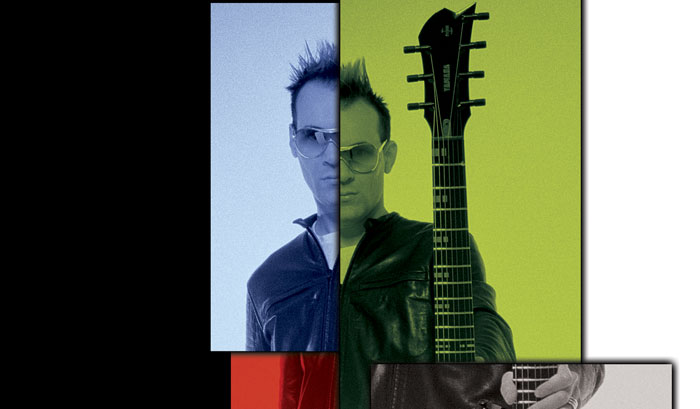


"Guitars don't interest me," insists Orgy guitarist Ryan Shuck. "I've never been interested in playing 'normal' guitar. I never put any time into learning scales or anything like that."
Yet despite--or perhaps because of--the attitude Shuck has generated some of the most striking guitar textures in recent rock. Orgy's breakthrough disc, Candyass, and its recent follow-up, Vapor Transmission, are packed with otherworldly textures concocted by Shuck and co-guitarist Amir Derakh.
Orgy's approach, says Shuck, emphasizes sound and noise over conventional riffing: "At this point, we can't even write songs based on normal guitar parts. We just start by making noise, and if it begins to sound cool, it may turn into a song. Our methodology is no method at all."
But unlike many other noisemakers, the LA-based quintet manages to break the rules and sell records.
Music and design are the same thing to me.
"That's true," says Shuck. "Our music may start out very messy and noisy, with literally hundreds of parts recorded onto the computer. But at some point we start discarding things and focusing on the essential melodies and rhythms that make a song memorable."
Derakh generates many of his striking sounds via guitar synth. But Shuck, who admits - or brags - that he is the less technically skilled player, crafts equally innovative sounds solely with guitars, amps, and stompboxes. "Most of the time, you can't even tell which of us is the synth guitarist," he claims, "especially since Amir's synth parts tend to be very 'guitar,' while my guitar parts are more likely to be airy and synth-like."
Another of Shuck's distinguishing traits: he almost never plays 6-string guitars, preferring 7-strings and 5-strings tuned in fifths (Bb, F, C, G, D). "I tune differently, because it forces me to play differently," he explains. "I love the idea of going for a usual note and not finding it there."
Shuck's take on guitar design is as unconventional as his playing. "To be honest, I'm not into how most guitars look," he says. "In fact, one reason I switched to Yamaha guitars is because they allowed me to design my own instrument. I wanted something that said 'Orgy.' It had to be elegant, modern, and sharp, and it had to sound better than the other stuff out there."
The result? The Yamaha AESRS7 7-string. "It looks absolutely modern," says Shuck. "It's something that would capture your interest even if you weren't into guitars, though guitarists will definitely be able to relate to it. It makes you want to create." Much of the uniqueness of the guitar's design has to do with what was omitted.
"There's only one pickup," says Shuck, "so there's no pickup selector. There are no tone controls, because they're almost always unnecessary in modern recording, where you have a half-dozen other ways to shape your tone. The tuners are minimallooking cylinders. The inlays are stainless steel. This is not a guitar for people who like to focus on buttons."
Shuck stresses two of the guitar's non-cosmetic details: "It's built to longer-than-normal scale, which is absolutely essential for low-tuned 7-string. The string tension stays tighter, so the tone is bigger, and it plays in tune better. Also, I've used a relatively lowgain DiMarzio custom humbucker pickup. A lot of players think they need a high-gain pickup for a heavy sound, but when you have too much gain, you get no tone out of the guitar."
Shuck acknowledges that he expresses himself more like an artist or designer than a guitarist. "Music and design are the same thing to me," he says. "In fact, our whole band came about because we were bored by bands that looked as though they worked in a gas station. Whatever happened to the idea of wanting to look insane? You're an artist - why try to act like you're not?"
























